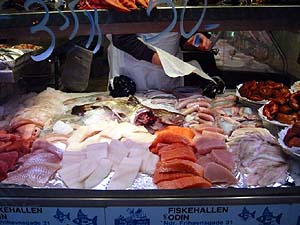Difference between revisions of "Food provision"
Dronkers J (talk | contribs) |
|||
| (4 intermediate revisions by 2 users not shown) | |||
| Line 1: | Line 1: | ||
| − | [[Image:Fish_market.jpg|thumb|right]] | + | |
| + | [[Image:Fish_market.jpg|thumb|right]] | ||
| + | One of the most tangible services provided by the marine environment is the provision of food for human consumption. Plants and animals derived directly from marine biodiversity | ||
provide a significant part of the human diet. Fisheries | provide a significant part of the human diet. Fisheries | ||
in particular, and the accompanying employment, | in particular, and the accompanying employment, | ||
provide a significant example of the importance of this | provide a significant example of the importance of this | ||
| − | function. | + | function<ref>Beaumont, N.J.; Austen, M.C.; Atkins, J.P.; Burdon, D.; Degraer, S.; Dentinho, T.P.; Derous, S.; Holm, P.; Horton, T.; van Ierland, E.; Marboe, A.H.; Starkey, D.J.; Townsend, M.; Zarzycki, T. (2007). Identification, definition and quantification of goods and services provided by marine biodiversity: implications for the ecosystem approach. Mar. Pollut. Bull. 54(3): 253-265 </ref>. |
| + | |||
<p>However, those species that are harvested commercially tend to be very heavily exploited, with stocks of many traditional favourites such as North Sea cod facing the threat of collapse. Seaweeds such as giant kelp, nori and agarweed are also very important commercially, historically being extremely important in East Asia. Conserving biodiversity of these groups will allow the use of under utilised resources in the future. A diverse ocean could potentially help to alleviate current and future commercial fishing pressures, provided these resources are managed responsibly. | <p>However, those species that are harvested commercially tend to be very heavily exploited, with stocks of many traditional favourites such as North Sea cod facing the threat of collapse. Seaweeds such as giant kelp, nori and agarweed are also very important commercially, historically being extremely important in East Asia. Conserving biodiversity of these groups will allow the use of under utilised resources in the future. A diverse ocean could potentially help to alleviate current and future commercial fishing pressures, provided these resources are managed responsibly. | ||
| + | |||
| + | |||
| + | == References == | ||
| + | <references/> | ||
Latest revision as of 19:57, 3 March 2022
One of the most tangible services provided by the marine environment is the provision of food for human consumption. Plants and animals derived directly from marine biodiversity provide a significant part of the human diet. Fisheries in particular, and the accompanying employment, provide a significant example of the importance of this function[1].
However, those species that are harvested commercially tend to be very heavily exploited, with stocks of many traditional favourites such as North Sea cod facing the threat of collapse. Seaweeds such as giant kelp, nori and agarweed are also very important commercially, historically being extremely important in East Asia. Conserving biodiversity of these groups will allow the use of under utilised resources in the future. A diverse ocean could potentially help to alleviate current and future commercial fishing pressures, provided these resources are managed responsibly.
References
- ↑ Beaumont, N.J.; Austen, M.C.; Atkins, J.P.; Burdon, D.; Degraer, S.; Dentinho, T.P.; Derous, S.; Holm, P.; Horton, T.; van Ierland, E.; Marboe, A.H.; Starkey, D.J.; Townsend, M.; Zarzycki, T. (2007). Identification, definition and quantification of goods and services provided by marine biodiversity: implications for the ecosystem approach. Mar. Pollut. Bull. 54(3): 253-265
